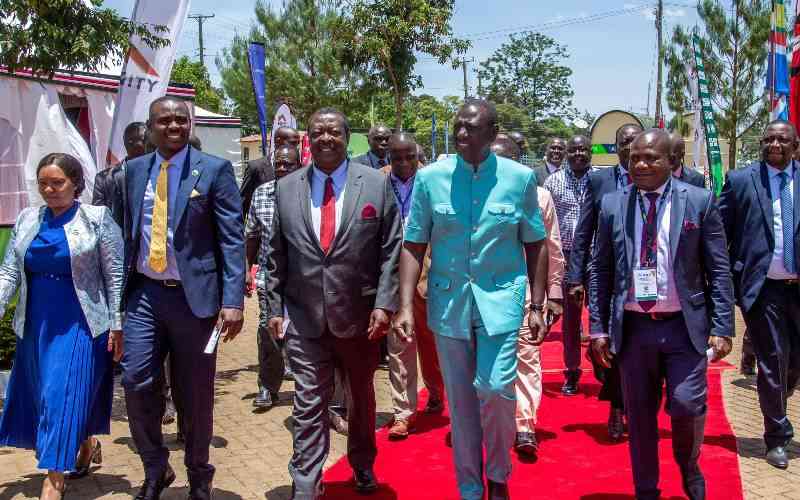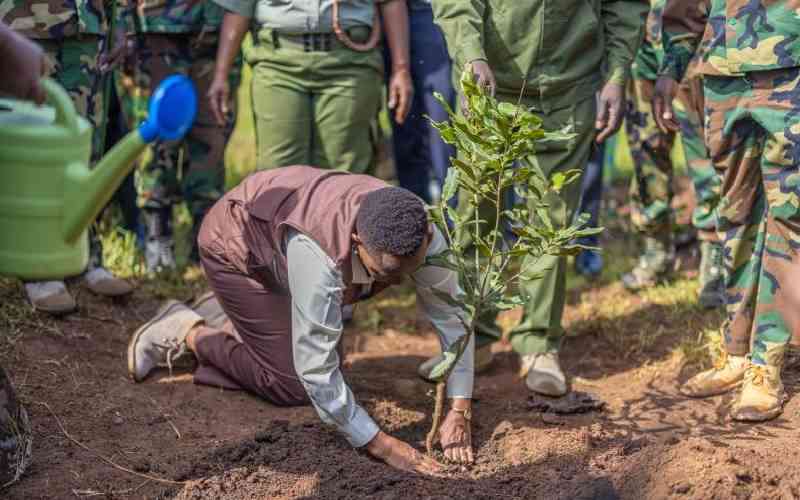On his shoulder, he carries a unique burden— ensuring mothers, fathers and children in Lubinu village Kakamega County enjoy healthy lives by having access to medical care whenever they need it. At 55, it is a call to service for this father of four.
Villagers fondly refer to Livingstone Anzetse as omusilishi omutiti (assistant doctor) for his selfless dedication in ensuring hygiene at home is maintained, expectant mothers attend ante-natal clinics and he also provides information on contraceptives and monitors child immunisations.
Anzetse is a community health worker in Mumias East in Kakamega County who is passionate about health advocacy.
For his passion, in 2009, the area chief offered him a two-week training on healthcare provision.
Afterwards he was deployed as a provider of basic health care and promoter of health, sanitation and nutrition practices.
Community health workers are charged with providing information on reproductive health, including contraceptives within their communities with referrals to health facilities and are expected to work part-time.
FIRST VOLUNTEER
However, according to Anzetse, community demands often require working full time. According to history, the first community health workers were trained in China in the 1930s and were known as Farmer Scholars.
They later came to be known as BareFoot Doctors because they trained illiterate farmers to record births and deaths, vaccinated against smallpox and other diseases, gave first aid and health education talks and helped communities keep their wells clean.
Globally, community health workers have been recognised as critical and invaluable players in the health system because they are more accessible and acceptable to clients and improve the overall coverage of health services.
Important as they may be, in Kenya, these health aides have not been incorporated into the formal health system due to lack of evidence of their critical importance.
So how has the journey been?
Anzetse confesses that it hasn’t been an easy journey being in a field associated with younger women.
“Initially, when I began the home visits, I met resistance from husbands who misinterpreted my intentions but with time they came to accept what I do. I was able to prove to them that even male community health workers are qualified and offer quality services like their female counterparts,” Anzetse says.
Anzetse cites the importance of male involvement in health matters and encourages couple sessions at their homes.
SAFE DELIVERIES
Literacy is not considered as a factor in the selection criterion to work as a community health worker. But it is crucial for a health aide to come from the community they work in for acceptability and ease of interaction.
Stay informed. Subscribe to our newsletter
Any challenges he faces? He cites cultural beliefs as one of the factors that hinder pregnant women from accessing health services.
“One of the popular beliefs is that health workers ‘tamper’ with the baby during the examination process and that babies are exchanged in hospitals during delivery,” he says.
FOLLOW-UPS
Much as many rural women prefer to give birth at home, hospital deliveries are safer, he says.
“When a mother delivers at home and complications occur, we are called in a huff and we have to organise for a motorbike to rush her to the nearest hospital yet this could have been avoided if she gave birth in a hospital,” Anzetse says.
Anzetse also conducts house calls to check on the immunisation adherence. “I request for immunisation card and check on the previous and next appointment and advise the mother on the importance of taking the child for regular clinics,” he says.
Anzetse also mentors young men to participate in community health outreach programmes.
One of his trainees is Michael Wangara, 27, one of the volunteers at the Youth Friendly Services available in 20 dispensaries and health centres in Mumias.
“We answer questions on maturity, sex and contraceptives and openly discuss their issues without being judgemental,” Michael says.
He says he cannot relent in his advocacy especially on reproductive health because he is aware of the fact that young men and women are engaging in sex from as early as 10 years, a fact that depresses him.
HOPEFUL
“As a young person, risky sexual behaviours among my peers prompted me to volunteer at the clinics. I wanted to be part of the team that provides reproductive health information to them,” says Michael.
And what’s Anzetse’s inspiration?
“My wife Eunice Shituma reminds me everyday that my work is a calling and I should dedicate my life to ensuring our village has healthier men, women and children,” he says.
Challenging as it maybe, Anzetse vows to continue serving people for better health outcomes.
 The Standard Group Plc is a
multi-media organization with investments in media platforms spanning newspaper
print operations, television, radio broadcasting, digital and online services. The
Standard Group is recognized as a leading multi-media house in Kenya with a key
influence in matters of national and international interest.
The Standard Group Plc is a
multi-media organization with investments in media platforms spanning newspaper
print operations, television, radio broadcasting, digital and online services. The
Standard Group is recognized as a leading multi-media house in Kenya with a key
influence in matters of national and international interest.
 The Standard Group Plc is a
multi-media organization with investments in media platforms spanning newspaper
print operations, television, radio broadcasting, digital and online services. The
Standard Group is recognized as a leading multi-media house in Kenya with a key
influence in matters of national and international interest.
The Standard Group Plc is a
multi-media organization with investments in media platforms spanning newspaper
print operations, television, radio broadcasting, digital and online services. The
Standard Group is recognized as a leading multi-media house in Kenya with a key
influence in matters of national and international interest.








